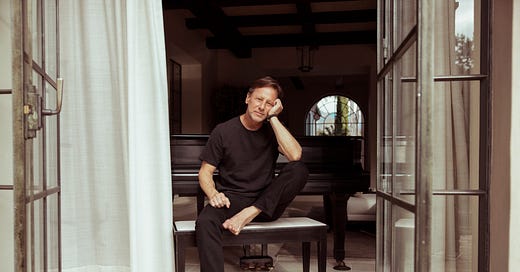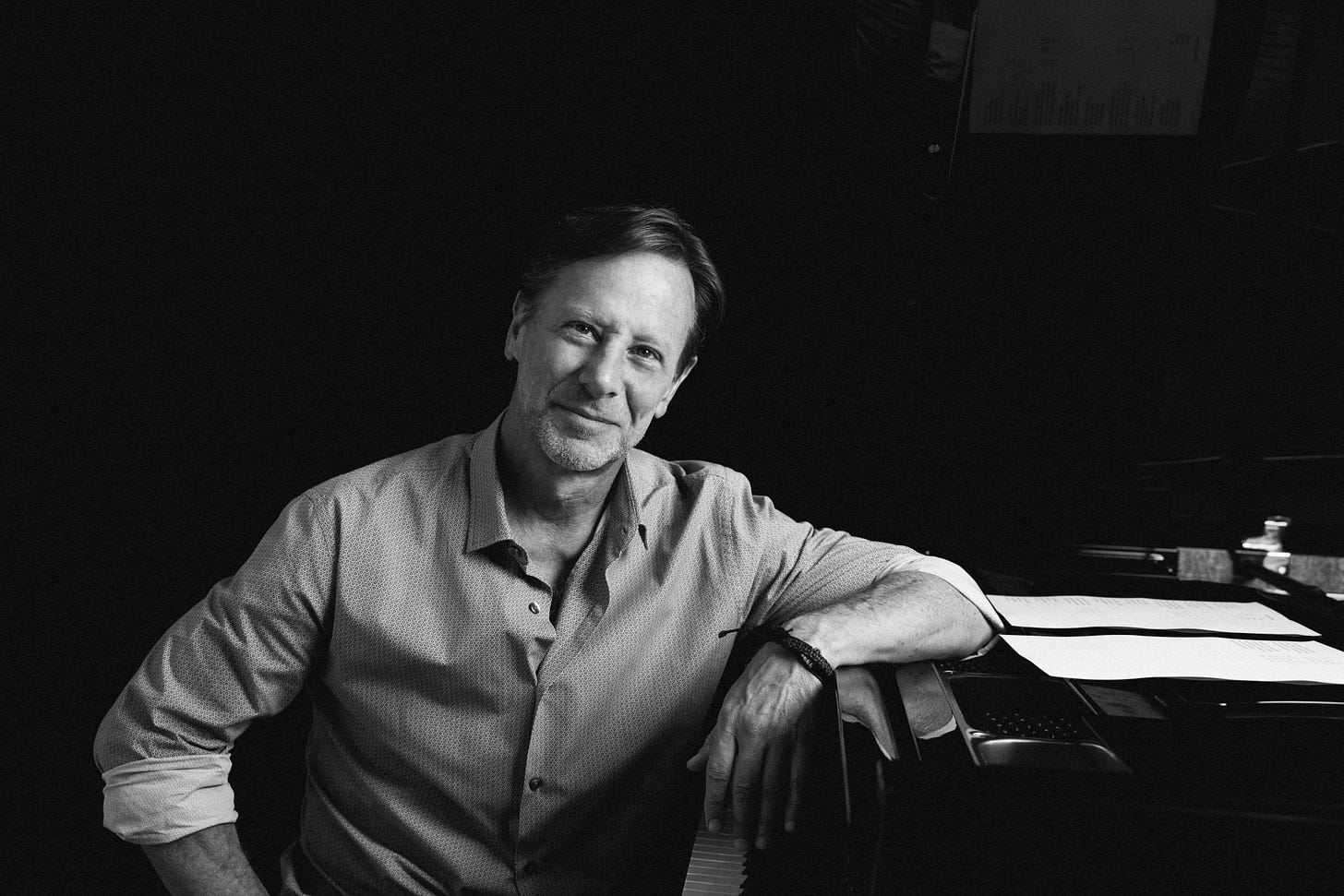CR 007: Pete Muller on the Importance of Embracing Dualities
The singer-songwriter discusses achieving success in both finance and the arts, his passion for music, and his latest album, “More Time.”
Pete Muller might be the only Forbes-profiled hedge fund manager to have busked in the New York City subway. After earning a mathematics degree from Princeton, Muller founded the asset management company PDT Partners in 1993. Over the past three decades, the company has become enormously profitable, leading Forbes to include Muller in its list of the Highest-Earning Hedge Fund Managers of 2019. Still, Muller, a self-described “word nerd,” isn’t content to stay in one lane. Even as he worked to transform Wall Street, he has simultaneously pursued a career in music—performing in train stations and coffee shops, writing songs, opening for artists such as Joan Osborne and John Oates, and releasing critically acclaimed albums. In addition, he also pens a monthly music-themed crossword puzzle for the Washington Post and engages in music philanthropy. (In 2017 he partnered with the Berklee School of Music and the City of New York to revitalize the legendary Power Station recording studio.)
This innovative approach—working concurrently in two seemingly contradictory fields, finance and the arts—is apt for Muller, who doesn’t like mutual exclusivity. “I’ve always been a person,” he says, “that, when given a choice, I want to do both. ‘Do you want to ski or snowboard?’ I want to do both. I’ve always been kind of an ‘and’ person. I want to do it all.”
This “and, not or” point of view is a running theme in Muller’s sixth solo album, More Time. Recorded in Memphis, it features an array of impressive talent, including Lisa Loeb, who joins Muller on the blues-drenched single “Run Out of Love.” I recently caught up with Muller over Zoom to discuss the album, his exceptional career, and why he defies labels.
SANDRA EBEJER: You have found success in both the arts and the financial sector. Those two fields rarely, if ever, intersect. But you’ve stated on your website that you don’t see yourself as being a hedge fund manager or a musician, you see yourself as being one and the other. Can you talk a bit about that?
PETE MULLER: I think to do anything innovative in business and finance and technology, there’s a huge amount of creativity involved. You know, coming from a deep place, assimilating everything that you’ve seen, and going, “Wait, let’s do this thing that hasn’t been done before.” That’s very similar to the process that you go through in writing a song and performing it and trying to pull things out and make something new. So I think the biggest part is creativity; that’s one aspect that really overlaps.
The second is being able to feel your own emotions and give voice to them, and to feel other people’s emotions. It’s obvious why that’s important in creating music and performing, but I find it incredibly important in business, as well. Because if you understand where people are coming from and you can build trust with them, you can help them grow in ways that would otherwise be impossible. And if you create that environment where collaboration works really well, people trust each other, and they feel heard and understood, amazing things are possible. So both of those things are [important]. Understanding melody, harmony, and lyrics really has nothing to do with quantitative mathematical models and finance, but the other parts are important for both. That’s where the intersection happens.
Are you still actively involved in the financial side of things while you’re touring and promoting this album?
I’m on sabbatical this year. I built this company 30 years ago. It’s a bunch of wonderful people. And my goal over the last 5 or 10 years has been to figure out who can do it better than me. This year is a really great test for that. But I’ll always be involved with them. I need both sides.
I mean, look at my journey—I was living in California, and I knew how to program computers, so I found a job programming at a firm. That’s where I learned quantitative finance. It was run by a Zen Buddhist UC Berkeley professor, and I was like, “Oh, this is just math and games, and I love math and games!” At the same time, I had a jazz band I played with. Then I got an offer to move to New York and build this [financial] group. It was a really tough challenge. I made it work, but I had this grand piano in my apartment that I barely touched during the five or six years I was building things. I was really obsessive. During that time of building and trying to make our group successful, that was fun, but once we got successful, I just kept going and kept spinning. And my life blew up.
So I took a break. I started pursuing music. I realized that I needed both in my life, and that I wouldn’t be happy without having both. Having both actually makes each side stronger. Becoming emotionally aware has really helped me on the business side. It goes back and forth.
When did you begin playing music? Did you play as a child?
I learned the piano at 10. I was classically trained. I played for five years. Then I got bored and quit. I just said, “I’m done. This is not that interesting, playing over and over again things that other people have written.” They’re beautiful, but it wasn’t my thing. And then a friend introduced me to a jazz teacher who lived half an hour away in Denville, New Jersey. My dad drove me every week for half-hour lessons, and he taught me how to improvise. That’s what changed my life. I started improvising. That took me to playing jazz and forming a jazz group. After my life blew up—that story I just told you—the way I processed it was I started writing songs. That’s what got my start.
I wrote the first few songs [in the vein of] “this has never happened to anyone else before in the world. My heart is broken. I can’t believe it.” And I realized, maybe there are other songs like this. Let me actually get better at telling the story, and how to tell a story that resonates with other people. That’s the journey I’ve been on. It’s been really fun, because I’ve continued to grow. This is now my sixth record and I feel like I keep growing as a songwriter and a performer.
I’d love to get your thoughts on something. I was talking to a friend recently about the arts. We both work in creative fields and neither of us makes any real money doing what we love. We got to talking about the value that our society places on the arts—artists are meant to live off their passion while those in the corporate world are expected to make significant amounts of money. You’ve worked in both fields; does this ring true to you?
I’m fortunate enough so that anything that I make in music I give away. I’ve done a few bigger things in musical philanthropy, and I love to help the ecosystem. But there are a lot of people that want to live their lives as creatives and there’s more supply than demand. So it becomes very, very competitive. I think right now the environment for artists to figure out how to make money commercially is probably stronger than ever. You had a dip when music got free all of a sudden with streaming and people weren’t buying records, but things are evolving. There’s more revenue in the music business than there ever has been. I think the tricky thing as an artist is you have to decide, what am I trying to do? Am I trying to be as creative as possible? Or am I trying to be as commercially successful as possible? Those can be in opposition. You have to spend time figuring out what people want and how deep are their tastes. Pricing is determined in a capitalist society like ours by supply and demand. If there’s a huge amount of supply because it’s so easy to create, it’s going to be harder and more competitive to make a living.
I think if you learn business skills as an artist, if you figure out how to market and figure out where money is, you will end up making more money, but you’ll spend less time being a great creator. That’s the tricky thing. Historically, there are many, many great artists that have died penniless, and many more that would have if they hadn’t found a wealthy sponsor to say, “I love your art. Let me help you create it.” I’m fortunate in being able to be my own sponsor that way, and I hope to also sponsor other people as well, at some point.
I enjoyed watching the video for “And (Hold On).” Can you share a bit about the inspiration for this song?
I tell this story at my shows sometimes. My wife said to me, “You’re getting serious about music. You want to see if you’re any good? Why don’t you go out and play in front of strangers?” I said, “Okay, that’s a great idea.” That’s when I started touring. I was gone a bit. Nothing crazy; I never really left home for more than 10 or 12 days. But we have a couple of kids, and at one point when she was a little upset, she said to me, “Do you want to be a good husband and father, or do you want to be a traveling musician?” I object to the word “or.” I want to do both. That’s the “and” [in the title].
The refrain of the song is “hold on to what you want.” For me, it’s to be able to play music and connect with fans that appreciate it. And also, “hold on to what you got”—I have a great family and love staying at home, too. I want both. And it’s not perfect. Sometimes things come into conflict, but if you put enough emphasis on both, hopefully you can keep both. That’s the philosophy.
There are a number of musicians who joined you on this album, one of whom is Lisa Loeb. How did you come to work with her on “Run Out of Love”?
My manager knows her manager. My band open for her for five dates last year, and she was really nice and gracious. We asked her if she wanted to do the vocal on this. I had recorded the whole song already in Memphis, and I had a singer in my band at the time [Missy Soltero] sing the female part on the vocal, [but] we ended up using Lisa. I just figured the name Lisa Loeb would probably help a little bit. You can hear Missy doing the scatting in the background; we kept that.
Your YouTube page features a number of videos of you doing cover songs. Who are some of your influences?
If someone says, “Tell me about your sound in 10 seconds,” I say, “Imagine if Bruce Springsteen and Shawn Colvin had a kid, but he played piano instead of guitar.” So on the piano side, I love Bruce Hornsby, Jackson Browne, Elton John, and Billy Joel. That kind of old school, ‘70s singer-songwriter [music]. I’m a huge Joni Mitchell fan. Eagles, Crosby, Stills, Nash, Van Morrison, Leonard Cohen. More modern day, you could go with Dawes. I love Dawes.
But the way those covers come about—one of my other pastimes is I’m a crossword puzzle constructor. I have a monthly music meta puzzle in the Washington Post. Whatever the answer is to the puzzle, I enlist some friends—usually my band, but sometimes other people that have played in the band or other friends that just happen to be around—and we do a cover.
Just last month, my friend Andrea McGee, who’s this amazing bodhran player and singer from Ireland, [joined me]. The answer to the puzzle was “Party in the U.S.A.,” so I asked her if she wanted to cover the song and she said, “Sure.” We rewrote the lyrics to “Party in the U.S.A.” about a musician from Dublin showing up in New York and Van Morrison came on [the radio] as opposed to Jay-Z. We’ve done a bunch of fun covers like that.
You’ve played with some really great musicians. Do you have a bucket list of people you’d love to either open for or play with?
Oh, man, there’s a huge bucket list. Both Springsteen and Shawn Colvin would be really fun to open for and I haven’t done either of those. I don’t know if either of those will ever happen. I’d love to open for Dawes sometime. I really love their songs, their writing—I love everything about the band. That’s in the feasible realm, I think.
Your story—both your personal story as well as the music on this album—reminds me of labels, and how we define ourselves by the labels that we were given by others and the labels we’ve adopted for ourselves. They can be restricting, and it can be very hard to break free from them, especially as we get older. What is your advice to those who feel stuck in some area of their life and know they want something different but don’t know how to go about making the change?
If you have a dream or a desire in you, if you have a longing, you don’t get that unless you have the ability to manifest it. I’ve always really, really believed that. And if you get those desires and you don’t act on them, you lose a little something of yourself. You lose your energy, your sparkle. You have to keep challenging yourself. You have to keep doing the hard thing. And putting a label on yourself—why would you do that? [Laughs] I mean, I surf. Am I a surfer? Yes, I’m a surfer. But does that define me? No. If I go for three months without surfing, I’m still a surfer or I was somebody who surfed. It shouldn’t affect your decisions at all.
Having goals and pursuing those goals is healthy. But being fixed, it just doesn’t work. I think we all struggle between wanting stability and comfort and ease and challenge. And there’s a continuum there. I think you need both in your life. And for people that say, “Well, it’s too late,” most of the time when people don’t do something and they come up with an excuse or a reason—”I’ve done this for so long; I’m an x, I’m not a y”—there’s a fear there. And it’s okay. It’s natural to be afraid. It’s the reason we survive. “Oh, don’t walk near that cliff” or whatever. But understanding what the real fear is, life or death fear versus emotional fear, and being able to punch through it, that’s so important to living a great life.
To learn more about Pete Muller, find him on Instagram.
This interview has been edited for clarity and length.
You might also enjoy…








